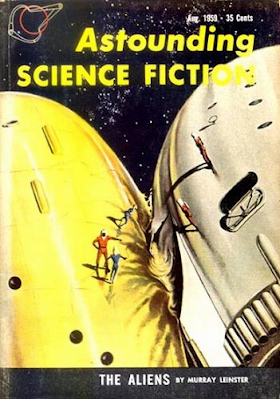(Arguable "spoilers" for the story throughout what's below; one can read it here first, if one chooses.)
I posted this note to a discussion list not too long ago, since I thought it might be of at least passing interest:
Probably familiar clip to some: Cassie Mackin, Arthur C. Clarke, Rod Serling on THE DICK CAVETT SHOW
12 July 1972: Clarke mentions 1959 ASF Ted Thomas story, "Day of Succession", which (pseudo-sophisticatedly) posits a pacifist US Pres. and VP, and the "necessity" of killing them to allow the Speaker of the House to do Necessary Killing as Head of State. Cavett also suggests a notional skiffy plot, and H. G. Wells is discussed briefly
Fellow panelist Cassie/Catherine Mackin, an NBC and ABC-TV reporter, died of cancer at 43.
--A fellow-member, writer and editor John Boston (see also), took issue with my characterization, which as I admitted in reply was based entirely on Clarke's description of the story (and, further blame all mine, I managed befuddledly to conflate Ted Thomas with the somewhat more knee-jerking Theodore Cogswell in memory as I watched the excerpt and, shortly after, posted the link).
I've now (re)read the story, which, since original publication in Astounding Science Fiction in the August 1959 issue, as far as ISFDB is aware has only been anthologized three times, albeit the three anthologies have been reprinted several times between them: Damon Knight's A Century of Science Fiction (1962), John F. Carr and Jerry Pournelle's Armageddon!: There Will Be War [series], Volume VIII (1989), and Dennis Pepper's The Young Oxford Book of Aliens (1998; Pepper being an editor who seems to be most interested in sf to the degree that it resembles horror fiction). As John noted,"I thought 'Day of Succession' was about how we get to fascism, which never lets a crisis go to waste."
Well, it is a seemingly double-bottomed story, which has fit comfortably within the world (and beyond)-view of Astounding editor John W. Campbell, Jr., that humans are the Most Dangerous Creatures (he seemed to posit this as a plus, more or less, and preferred fiction where humans were always the superiors of any other sort of sentient creatures they might encounter--as well as avowedly loving to publish stories that would "shake up" readers), and of the militarist editors of the long There Will Be War series, while not actually putting forward any sort of argument for the Destroy the Village in Order to Save It attitude of the not quite protagonist, a highly-placed US Army general, aside from his paranoia in regards to the hostile nature of the alien visitation proving to be apparently correct, as far as we can tell...albeit, that affirmation of their hostility occurs after extreme hostility and destruction, by his command, of the first aliens to arrive, and his claim of the aliens having not being able to make any warning to their fellow-travelers.
Ted Thomas, who also signed his work Theodore L. Thomas (and wrote, and occasionally co-wrote with Charles Harness a humorous series of patent-related sf stories as by Leonard Lockhart) never published a collection, and his only two novels I'm aware of were in collaboration with Kate Wilhelm, and the first, The Clone, is the best "Blob" story I've read and a fine novel by any standard (it expands a shorter solo story of his). His "The Family Man" (which I read upon publication in The Magazine of Fantasy and Science Fiction, March 1978) is a story that has stuck with me much more vividly than "Day of Succession", which I first read not long after, in my copy of the Knight anthology...but this vignette makes its points...and lets you sort them out.
(Thomas's 1962 story "Test" is one which haunted readers for decades...one of the most-remembered stories librarians and booksellers would be queried about by people who couldn't remember the author, title, or both...but the story stuck with them. It can be read, or reread, here.)
Please see Patti Abbott's blog for more of today's short fiction reviews.



3 comments:
Although the depiction of a car accident is well-done, I don't find the ending particularly compelling. Perhaps is has been copied by other writers since the original publication.
A CENTURY OF SCIENCE FICTION looks like a very good anthology with stories by lots of interesting authors. Maybe someday I will get a copy.
The story was very interesting and not at all what I expected.
Patti--"Test" remained in memory for once-young readers who probably read it in David A. Sohn's widely-distributed Bantam Books anthology Ten Top Stories (1964) or Xerox's classroom-use magazine Read (I read it there for a ?third time ca. 1976), or elsewhere...young and naive readers can easily be impressed by notional stories when well-turned and vivid. Hence, a lot of Bradbury-love.
I have, at least 10 times over 30+ years, suggested this story in response to requests/queries from bookstore and library patrons, and on librarian and other stumper-list posts, and it has turned out to be what was sought.
Tracy--glad you liked "Day..."; A CENTURY OF SCIENCE FICTION is a good read, and at time of publication even a bit polemical, as Knight's anthologies tended to be, in making no bones about sf long preceding in existence the wide application of that term for the literature (in 1929), in 1962. Thomas helped DK put it together, though I suspect Knight liked "Day..." a lot on its own merits.
Post a Comment